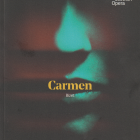Carmen 2023Scottish Opera
Read more about the opera Carmen
A departure for this new production was that it was sung in English. Last time this was done with a full scale staging was before the arrival of supertitles. These are now applied as a matter of routine, even when the performance is sung in English. It is quite helpful for audiences, and does not seem to encourage sloppy diction on the part of singers. The translation by Christopher Cowell was fluent and generally excellent - a great improvement on some we have heard in the past.
The opera is traditionally performed in one of two versions. The only text prepared by Bizet is the opéra-comique form, with spoken dialogue. To give it international exposure, where non-French singers might struggle with the speech, recitatatives were prepared by Ernest Guiraud, initially for Vienna, and it was this grand opera format that generally held the stage until quite recently, when the dialogue version has made a long overdue comeback.
The director John Fulljames made an interesting decision to ditch both versions. A new dialogue scheme was introduced, with a succession of flashback scenes in which José was interrogated by an 'Investigator', played by the actor Carmen Pieraccini. This generally worked quite well - she created a convincing character, and the tenor Alok Kumar was the only singer required to learn significant amounts of new dialogue and to act it out. They remained on stage while all the other activities took place. One advantage of this scheme was perhaps that the other singers did not have to learn or rehearse the usual pages of dialogue.
The production was seen well into the run - the Sunday matinee in Edinburgh was the twelfth of the fifteen performances, and it ran as well as that would suggest. There were no weak links among the soloists, and chorus and orchestra were on excellent form.
The production concept was an update to the 1970s, when the appalling Franco regime was on its last legs. This allowed the Investigator to use a projector to cover the set with appropriate photographic material. But otherwise the update didn't seem to be of any great importance - certainly no harm done to this masterpiece, but nothing earth-shattering. There was no attempt to create the usual atmospheric inn for the second act or mountain pass for the third - it was all fairly abstract.
The excellent Lithuanian Carmen, Justina Gringyté, sang the role in French in the last run of the previous production. Re-studying it in English must have been an interesting experience for a non-native speaker, even for a singer now fluent in the language. As before, she was a thoroughly convincing actor, and this was a very different reading from the one she gave back in 2015.
Hye-Youn Lee is now a firm favourite with Scottish Opera's audiences. Perhaps Micaëla is a less interesting character than her two Puccini roles in the autumn, but she gave a lovely performance of her solo in the third act. She returns to the company next year for Violetta, whic is really something for us all to look forward to.
Phillip Rhodes has worked more with Opera North than in Scotland, but his last appearance as Ford was excellent and he made an effective appearance as Escamillo. His Toreador aria delivered on a rotating table was reminiscent of Sergei Leiferkus in the old Graham Vick production thirty years ago. The tenor Alok Kumar has sung José in a number of stagings, espcially in the USA, and seemed very comfortable in what must have been a very different approach to the part. The four Scottish Opera Emerging Artists all did well - the 'Smugglers' Quintet' sequence went very well. The Moralès and Zuniga also made an unusually strong impact as characters.
Conductor Dane Lam made a positive impression in 2017 with Traviata - not an easy work with which to make a debut. His control of this performance was generally excellent, particularly in the rousing sections.
The whole enterprise was received with huge enthusiasm by the crowded audience. One serious reservation has to be mentioned however. While it may just be acceptable to use amplification for sequences of spoken dialogue, it was very difficult to accept its employment throughout. The orchestra was always loud, even the supposedly quiet sequences, and the big ensembles were overwhelming. This meant that it was all a bit exhausting to listen to.
Performance Cast
Production Cast
- Conductor
-
Dane Lam (Exc May 23, 25)
Toby Hession (May 23, 25)
- Director
- Designer - Sets
- Designer - Costumes
- Lighting
- Video Director
- Choreography
- Translator
- Orchestra
- Sponsor
Performance DatesCarmen 2023
Theatre Royal, Glasgow | Glasgow
12 May, 19.15 14 May, 15.00 16 May, 19.15 18 May, 19.15 20 May, 19.15
Eden Court Theatre | Inverness
23 May, 19.15 25 May, 19.15 27 May, 19.15
His Majesty's Theatre, Aberdeen | Aberdeen
1 Jun, 19.15 3 Jun, 19.15
Festival Theatre, Edinburgh | Edinburgh
9 Jun, 19.15 11 Jun, 15.00 13 Jun, 19.15 15 Jun, 19.15 17 Jun, 19.15

